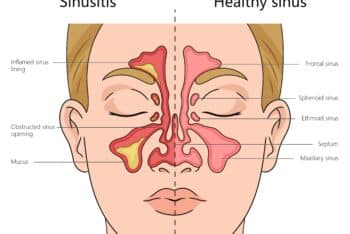Blog

The Difference Between Food Allergies and Food Sensitivities: What You Need to Know
Do certain meals leave you feeling unwell, but you’re unsure why? You’re not alone. Millions of Americans struggle to distinguish between food allergies and sensitivities. This confusion can lead to unnecessary dietary restrictions or overlooked health risks. Let’s clarify the key distinctions and help you find real answers. At Lakeside Allergy ENT in Rockwall and […]
Read More
Adenoid Removal vs. Tonsil Removal: What’s the Difference?
If your child frequently experiences sore throats, ear infections, or trouble breathing through the nose, you may wonder whether adenoid or tonsil surgery is the next step. While these two procedures are often performed together, they each address different issues and involve other areas of the throat. At Lakeside Allergy ENT, our board-certified ENT specialists in Rockwall […]
Read More
The Importance of Early Hearing Tests for Speech and Language Development
Hearing plays a fundamental role in a child’s ability to develop speech and language skills. When undiagnosed hearing loss occurs in infants or young children, it can lead to delays in communication, learning, and social interaction. Early hearing tests are essential for identifying potential issues before they impact a child’s developmental milestones. But why is early screening […]
Read More
Why Kids Get More Sinus Infections and When to Seek Treatment
Children are more prone to sinus infections than adults, leading to frequent congestion, discomfort, and difficulty breathing. As a parent, understanding the causes of pediatric sinus infections and knowing when to seek treatment is crucial. Your vigilance can help prevent complications and improve your child’s overall well-being. At Lakeside Allergy ENT in Rockwall and Forney, our board-certified ENT […]
Read More
The Link Between Allergies and Sleep Apnea: Why Testing Matters
Allergies and sleep apnea often go hand in hand, creating a cycle of poor sleep and discomfort. Allergies can cause nasal congestion, making breathing harder and exacerbating sleep apnea symptoms. Understanding the connection between these two conditions not only provides clarity but also a sense of relief, and allergy testing plays a key role in managing them […]
Read More
Top 5 Benefits of Using Propel Sinus Implants After Sinus Surgery
Chronic sinusitis can disrupt daily life, causing discomfort, congestion, and difficulty breathing. For those undergoing functional endoscopic sinus surgery (FESS), propel sinus implants offer an innovative solution to enhance recovery and improve long-term results. Here’s why they are a preferred option for many patients. At Lakeside Allergy ENT, we are proud to be leaders in providing advanced […]
Read More
The Connection Between Parathyroid Disorders and Calcium Levels
Have you noticed symptoms of calcium imbalance, such as fatigue, bone pain, or muscle cramps? These may stem from your parathyroid glands, which are crucial in maintaining proper calcium levels. At Lakeside Allergy ENT, our team of four experienced otolaryngologists often sees patients who have no idea that their issues are related to a parathyroid disorder. In […]
Read More
Can The Flu Affect Your Ears?
Have you ever wondered if the flu can impact your ears? It turns out, that flu symptoms aren’t just limited to the common cough, fever, and chills; they can also include ear-related issues. Especially during flu season, it’s important to recognize how this illness can extend beyond typical symptoms and potentially lead to complications like ear […]
Read More
Is It Time to Try a Sinus Implant?
Chronic sinusitis affects millions of people each year, making it one of the most common health complaints in the United States. If you’re constantly battling sinus infections, face persistent nasal congestion, or suffer from nasal polyps, you might have explored several treatment options with varying degrees of success. It may be time to consider a […]
Read More
What Happens During a Hearing Evaluation?
If you’ve been experiencing hearing difficulties or suspect you may have hearing loss, a hearing evaluation can help you understand your hearing health. This painless and straightforward procedure is conducted by an audiologist to assess how well you can hear sounds. Plus, they can examine whether corrective action, such as hearing aids, might be necessary. Knowing what […]
Read More